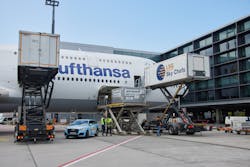The year 2020, during which the COVID-19 pandemic caused massive disruptions in India’s aviation sector, forced the government to impose strict restrictions on air travel, resulting in a sharp decline in air traffic.
However, some domestic airlines facing the gloomy prospect of heavy losses turned their attention to the air cargo sector, which appears promising and could get a strong boost if India also builds up cargo transit hubs.
Ground Handling Services to be Strengthened
Demand for sophisticated ground support equipment (GSE) is also expected to grow as the government embarks on modernizing airport operations using the latest technology that would boost efficiency and help save time and costs.
Indeed, the nation’s apex airport managing agency, the Airports Authority of India (AAI), which owns 125 of the nation’s 460 airports, is working to upgrade ground handling and ensure long-term functioning – at least for 10 years.
The AAI has taken initiatives to appoint ground handling agencies for 83 state-run airports for a 10-year period. Airport officials, speaking on condition of anonymity, have said that the intention was to cut the size of the ground handling personnel on the airside, and streamline the process so that “untoward incidents” can be avoided.
Air India Airport Services Ltd., a fully-owned subsidiary of the national carrier Air India, and the Air India SATS Airport Services Private Limited (AISATS) – the latter a 50:50 joint venture of Air India Limited and SATS Limited – are the country’s two major ground handling agencies.
Airlines such as Indigo and SpiceJet do their own ground handling at a number of Indian airports, using their employees for this purpose. But others contract third parties to provide such services. International airlines use the services of domestic ground handling agencies in India.
Meanwhile, as part of their cost-cutting measures, forced by the second, more devastating COVID-19 wave, private airlines are downsizing or even completely outsourcing ground handling work at airports to companies that provide specialized ground handling services. SpiceJet, a private Gurugram based budget airline, has outsourced its loading and driving services at Mumbai airport to CelebiNAS Airport Services India.
Delhi Cargo Terminal Management India, a joint venture between DIAL and Çelebi Ground Handling of Turkey, is currently one of the largest cargo terminals by volume in the country. Murali Ramachandaran, who heads the company’s operations in India and is a seasoned veteran of the aviation industry, has said in media interviews that he does not foresee business volumes returning to the 2019-level anytime soon. He said that in the event of a slow-paced recovery, the volumes could return to the pre-COVID levels only by 2022.
Cargo to Bolster Indian Airports’ Business
Cargo has raised the hope of many airports. The Indira Gandhi International Airport (IGIA) in New Delhi, which handled 955,000 metric tonnes of freight in fiscal year 2020, emerged as the country’s leading cargo handling airport; however, the share of domestic airfreight dropped by some 7 percent in 2020 on a year-to-year basis.
Other airports are also focusing on cargo, hoping to revive business and offset the passenger traffic downturn.
Building India’s Transit Hubs
The government’s National Air Cargo Policy has heightened the expectations of Indian freight forwarders, particularly because the policy purports to make India one of the top five air freight markets by 2025 and create air-transport shipment hubs at all major airports. The policy also aims to leverage India’s geographical location as a transit hub between Europe and Southeast Asia and a gateway to the South Asian region. The policy could encourage code-sharing/interline agreements between foreign and Indian carriers.
Experts say that India needs transshipment cargo hubs not only because of the country’s potential to grow as one of the world’s largest economies and the huge size of its consumer market but also because the country, after overcoming the current pandemic-precipitated economic downturn, will also play an increasingly important role as one of the Indo-Pacific region’s major economic growth engines, helping to drive Asia’s regional trade and investment flows.
But to achieve this, India needs to undertake investment, and aggressively promote exports to sustain rapid economic growth over the next five years.
IGIA has launched a dedicated transshipment center exclusively for cargo services. The facility called “Transshipment Excellence Center” is about 70,000 square feet and can handle about 20,000 tons of cargo a month. The airport operating agency, Delhi International Airport Limited (DIAL), was the first to take up the initiative under the National Civil Aviation Policy 2016, which aims to develop air cargo transshipment hubs at major airports.
With India expected to post robust growth in aviation, assuming that the pandemic is quickly brought under control and there is no worsening of the situation, experts agree that the country has the potential to play a much larger role in both passenger and air cargo traffic; suppliers of all kinds of airport equipment, including ground and cargo handling, are rubbing their hands in glee over such a prospect.
India’s air cargo potential has not been fully tapped. This can be seen from the fact that the total annual volume of about 2.5 million metric tonnes of cargo handled by all Indian airports is less than that handled by individual airports such as Memphis, Hong Kong, Shanghai, Incheon, Anchorage and Paris.
Hyderabad Airport Aggressively Promotes Cargo Traffic
After Delhi Airport, the upcoming Noida International Airport Limited (NIAL) in nearby Jewar is expected to be a major air cargo hub for India. According to the development plan of the Techno-Economic Feasibility Report (TEFR), NIAL will be a transshipment hub for the country once it starts operations in 2022-23, though some experts believe it could be delayed due to several reasons, including the pandemic.
Experts agree that India’s geographic location gives it “strong strategic advantages” as a future transit cargo hub. Nevertheless, there are also challenges, including inadequate infrastructure to ensure timely and efficient cargo handling.
Vidah Kumar Jaipuriar, the CEO of DIAL averred that India’s air-cargo sector had witnessed “robust growth” in the past couple of years. The National Air-Cargo Policy Outline 2019 focused on many initiatives aimed at elevating India to the rank of one of the top freight markets in the world. Jaipuriar has said that Delhi’s Transshipment Excellence Center is intended to achieve “seamless and efficient movement of transshipment cargo.”
Delhi Airport has two air cargo terminals with 1.8 million metric tonnes of annual cargo handling capacity, which can be increased to 2.3 million metric tonnes. Delhi Airport has also developed warehousing facilities with 30,000 square meter area for freight forwarders and other logistics companies at the airport. Delhi airport set a record in fiscal year 2018 by handling 1.04 million metric tonnes of cargo, the highest cargo volume ever handled by an airport in India.
The significance of pharma and perishable products, already a mainstay of India’s supply chain, gained further significance with the outbreak of COVID-19. Delhi airport developed temperature-controlled facilities with 150,000 metric tonnes of handling capacity comprising multiple temperature range chambers.
The airport has also acquired modern ground handling equipment, including cool dollies to carry cargo to maintain the cool chain from the terminals to the aircraft. The International Air Transport Association (IATA) has given Delhi airport an AWB360 certification, the first for an Indian airport, for paperless cargo processing.
GMR Hyderabad International Airport Limited (GHIAL) is also working to transform itself to a major cargo hub given the concentration of pharmaceutical companies in its surrounding region.
S.G.K. Kishore, executive director – south and chief innovation officer, GMR Airports, has said that India’s air cargo business has been witnessing an annual growth of 11 percent in the pre-pandemic years.
He spoke of “strong indicators” suggesting “robust market growth” in India. He cited the new National Air Cargo Policy supporting industry policies such as National Integrated Logistic Policy (NILP), EXIM Policy, Free Trade Agreements and Air Service Agreements for paving the way for the progress of air cargo business in India. Air trade is seen as an important driver in India’s trade.
According to Kishore, GHIAL is trying to build the necessary infrastructure facilities. GHIAL’s expansion plans for the existing facilities have been vindicated by the strong double-digit growth in cargo traffic.
It has been adding new infrastructure, transshipment facilities, integrated express terminal, dedicated perishable facilities, pack houses and dense network of international and domestic – air and road – multimodal connectivity.
Hyderabad airport, which is currently handling annual cargo volume of about 100,000 metric tonnes, illustrates how it can evolve to become a transit cargo hub. Lufthansa Cargo has already identified Hyderabad airport as its pharma hub, with Cathay Pacific recently adding twice weekly Boeing 747 freighter service to the airport. Also, Thai Airways and Blue Dart are offering main-deck through their Boeing 747-400F MD-11F and Boeing 757F freighters.
In addition, about 18 scheduled airlines, including 13 international, have cargo bases at Hyderabad airport, with belly capacity space ranging from 2 to 3 tonnes in a 737 type aircraft, and 20-25 tonnes in the larger 747-type aircraft.
Hyderabad airport, keen on promoting exports of coronavirus vaccine doses to other countries, has entered an agreement with Dubai airport to build an exclusive vaccine freight corridor called “HYDXB-VAXCOR,” or the Hyderabad to Dubai Global Vaccine Corridor.
According to the memorandum of understanding (MoU), the two airports will handle temperature sensitive vaccine shipments “for further connections to various continents.”
India also needs large quantities of vaccines. To meet India’s heavy demand for vaccines and life-saving medical supplies and equipment amid the second pandemic wave, several carriers have been flying these supplies to India. These include Air Logistics Group, FedEx Express, IAG Cargo, Air Canada Cargo, Antonov Airlines, Oman Air, SpiceXpress, Volga-Dnepr Airlines and Emirates SkyCargo, among others.
Dubai-based Emirates SkyCargo flew 100 tonnes of relief materials free of charge from Dubai to India during a three-week period in May 2021 in support of the Indian community’s efforts to battle the second pandemic wave. Under the Emirates India Humanitarian Airbridge, Emirates donated cargo capacity to transport essential supplies, such as relief tents and thousands of oxygen cylinders, free of charge on flights to Indian destinations. Nabil Sultan, Emirates divisional senior vice president, cargo underscored in recent statements that Emirates was “deeply connected and committed” to India.
Digitalization's Role in a Bigger Success Story
Many experts believe that digitalization could be a game-changer for India’s air cargo traffic. Counting on the prospects of the National Air Cargo Policy, Ram Menen, former Independent Director, Expofreight, believes that digitalization could raise the efficacy of Indian airports.
In his view, it is very important that all airports and related authorities work with one common system enabling all stakeholders to access and interact with.
The growing importance of India in the international supply chains for products such as pharmaceuticals, including COVID-19 vaccines, was also underlined by Alexander Konnen, the managing director of time:matters, an associate of Lufthansa Cargo.
“We work with Lufthansa-Cargo and organize flights to India. Most shipments are destined for Delhi airport. The delivery clearance at Delhi Airport runs smoothly,” Konnen says.
But Konnen also points out that India could be an “even bigger success story” if Indian airports enhanced their level of digitalization.
time:matters operates airmates global platform digitizing the market for On-Board Courier services. Airmates is a software-based platform for On-Board Courier services.
International cargo operators, generally, feel that Indian airports still use unnecessary paperwork. Many experts say that red tape causes delays and this needs to be cut down to a bare minimum.
“Indian airport infrastructure, particularly at major airports, is good and facilitates our smooth operation,” Konnen says, adding that since time:matters sends belly-hold cargo, it does not need special cargo flights.





